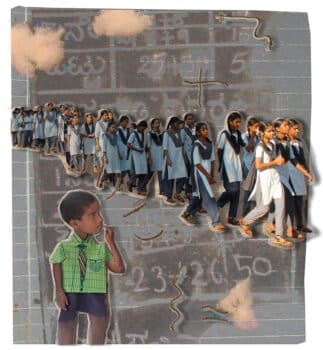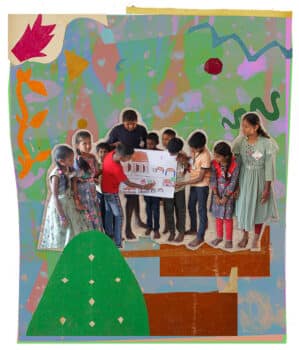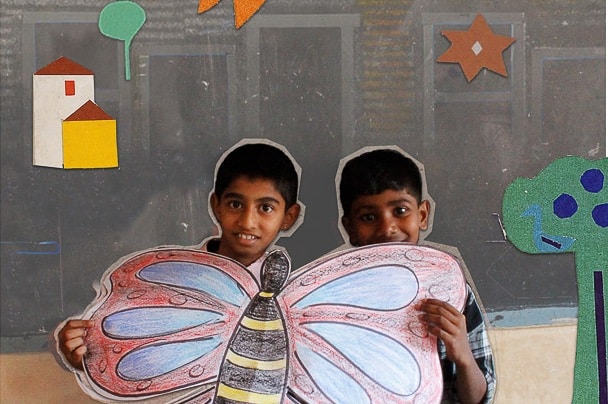Dear friends,
Greetings from the desk of Tricontinental: Institute for Social Research.

Students from Siddapura and nearby villages participate in a rally to inaugurate the 2023 Joy of Learning Festival in Siddapura.
In 1945, the newly formed United Nations held a conference to found the United Nations Educational, Scientific, and Cultural Organization (UNESCO). The main concern of the delegates, particularly those who came from the Third World, was literacy. There needs to be a ‘world crusade against illiteracy’, said Dr Jaime Jaramillo Arango, the rector of the National University of Colombia. For him, and several others, illiteracy was ‘one of the greatest outrages to human dignity’. Abdelfattah Amr, the Egyptian ambassador to the United Kingdom and a champion squash player, said that illiteracy was part of the broader problem of underdevelopment, as evidenced by ‘the shortage of technicians and the scarcity of educational materials’. These leaders found inspiration in the USSR, whose Likbez (‘liquidation of illiteracy’) programme virtually eradicated illiteracy between 1919 and 1937. If the USSR could do this, then so could other largely agricultural societies.
In December 2023, the Organisation for Economic Cooperation and Development (OECD) released a stunning report showing that, since 2018, literacy in reading and mathematics has declined amongst the world’s students. Importantly, they noted that this situation could ‘only partially be attributed to the COVID-19 pandemic’: scores in both reading and science had been on the decline before the pandemic began, though they have only worsened since. The reason, the OECD notes, is that there has also been a decline in the time and energy that teachers and parents devote to assisting their students and children. What the OECD does not mention is that this decline in support over the past fifty years is a result of the austerity regimes that have been imposed on most societies in the world. Education budgets have been cut, which means that schools simply do not have enough resources or staff to begin with, let alone enough teachers to provide the extra support that struggling students need. As part of school funding cuts, states have insisted that corporate education providers generate textbooks and learning modules (including online systems) that disempower teachers and demoralise them. As parents work in increasingly uberised professions, they simply do not have the time nor the energy to supplement their children’s education.
Why have states across the world been unwilling to adequately fund public education? In the Global North, where there is significant social wealth, leaders are reticent to tax the highest income earners and wealth holders, tending instead to use the remaining precious resources to fund the military establishment rather than social services such as education, health, and elder care. Global North countries that are within the North Atlantic Treaty Organisation system spend trillions of dollars on weapons (three quarters of total global military spending) but miniscule amounts on education and health care. This is evident in the OECD’s report, which notes precipitous declines in mathematical knowledge in countries such as Belgium, Canada, and Iceland–none of them poor countries. The OECD report suggests that this is not merely because of funding levels, but also because of ‘the quality of teaching’. However, the report does not point out that this ‘quality’ is the outcome of austerity policies that rob teachers of the time needed to teach and support students, of having a say in the materials in the curriculum, and of the resources needed for additional training (including sabbaticals).

A group of students present the map they made after touring a village as part of the Uru Tiliyona (‘let’s find out about the village’) corner activity.
In the Global South, the declines are attributed more directly to the collapse of funding. Studies over the past few years, and our own analysis of International Monetary Fund (IMF) staff assessments, show that the organization has pressured poorer nations to cut public sector funding. Since the wages of most teachers make up part of the public sector wage bill, any such cut results in lower teachers’ salaries and higher teacher to student ratios. An ActionAid study of fifteen countries, from Ghana to Vietnam, showed that the IMF forced these states to cut their public sector wage bills for several budget cycles (up to six years) to the tune of $10 billion –equivalent to the cost of employing three million primary school teachers. Another study, produced by the United Nations Office for the Coordination of Humanitarian Affairs, shows that the IMF has enforced budget cuts in 189 countries that will remain in place until 2025, by which point three-quarters of the world is projected to remain under austerity conditions. A UN Development Programme report noted that twenty-five poor countries spent 20 percent of their revenues in 2022 to service external debts–more than twice the amount spent on social programmes of all kinds (including education). It would seem that it is more important to satisfy wealthy bondholders than children that need their teachers.
This horrendous situation condemns Sustainable Development Goal no. 4 (ending illiteracy) to failure. To meet this objective, the world would need to hire 69 million more teachers by 2030. That is not on the agenda of most countries.
In 1946, the UK’s Minister of Education Ellen Wilkinson served as the president of the first UNESCO conference. Wilkinson, who was known as ‘Red Ellen’ (and was one of the founders of the Communist Party of Great Britain in 1920), led the fight for the unemployed in the 1930s and was a champion of the Spanish Republic. During World War II, she said, we witnessed ‘the great fight put up against this monstrous wickedness [of the ‘narrowest nationalism’ and ‘subservience to the war machine’] by the intellectual worker, by men and women of integrity of mind’. Red Ellen explained that the fascists knew that reason and literacy were their enemies: ‘In every land which the totalitarians over-ran, it was the intellectual who was picked out first to face the firing squad–teacher, priest, professor. The men who meant to rule the world knew that first they must kill those who tried to keep thought free’. Now, these teachers are not put before the firing squad; they are simply fired.
But these intellectual workers did not surrender then, and they are not surrendering now. Our latest dossier, How the People’s Science Movement Is Bringing Joy and Equality to Education in Karnataka, India, shines a light on intellectual workers who are finding innovative ways to bring scientific and rational thought to children in Karnataka, such as through their movement’s Joy of Learning Festivals, neighbourhood schools, and ‘guest-host’ programme. This is taking place in a context in which the government of India has decided to cut evolution, the periodic table, and the sources of energy from the curriculum and school textbooks – despite the alarm raised by nearly 5,000 scientists and teachers who signed a petition drafted by the Breakthrough Science Society calling upon the government to reverse its decision.
The petition and Joy of Learning Festivals alike are part of a broader movement to democratise knowledge and dismantle wretched social hierarchies. The Bharat Gyan Vigyan Samiti (Indian Science Knowledge Association or BGVS) holds Joy of Learning Festivals to promote scientific learning and rational thought across the Indian state of Karnataka, which has a population 65 million–about the same as France. Our dossier shows how the BGVS has brought joy to science education for millions of young children in India.

Cubans celebrate at the closing march of the literacy campaign in Havana’s Plaza de la Revolución, December 1961. (Photo: Liborio Noval)
Imagine you are a young child who has never been exposed to the laws of science. You find yourself at a BGVS festival in a rural area of Karnataka, where there is a stall with a dismantled bicycle. The teacher at the stall says that if you can assemble the bicycle, you can have it. You run your fingers through the chain, the gears, the frame of the bicycle. You imagine what a fully assembled bicycle looks like and try to put the pieces together, at the same time coming to an understanding of how energy is generated by pushing the pedal, which, through the gears, amplifies the movement of the wheels. You begin to learn about the laws of motion and torque. You learn about the simplicity of machines and their immense utility. And you laugh with your friends as you struggle with the puzzle of all the pieces of the bicycle.
Such an activity not only brings joy to the lives of a million children in Karnataka; it also enhances their curiosity and challenges their intelligence. This is the heart of the work of the BGVS and its Joy of Learning Festivals, which are run by government schoolteachers recruited and trained by the science movement. This kind of festival not only rescues the collective life but is a mechanism to lift up the work and leadership of local teachers and affirm the importance of scientific thinking.
In 1961, the Cuban singer Eduardo Saborit wrote the beautiful song Despertar (‘The Awakening’) as a tribute to the Cuban literacy campaign. ‘There are so many things I can already tell you’, he sings, ‘because at last I have learned to write. Now I can say that I love you’. Now, I can understand the world. Now, I can no longer feel diminished. Now, I can confidently put one foot before the other and march to change the world.
Warmly,
Vijay

